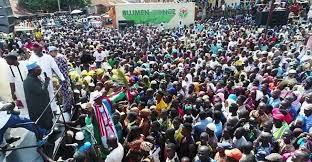Nigeria, the Africa’s
most populous country, recently exited her worst recession in the last 25
years. Despite escaping the recession, the country is battling various
uncertainties ahead of 2019 general elections.
Besides the political uncertainties, government
of the President Muhammadu Buhari is working towards returning the economy to
its previous growth using various macroeconomic policies. The political
uncertainties being driven by the preparations towards the general elections
and the government’s policies will certainly have medium and long-term effects
on businesses.
The
recent mass defection of some members of the ruling party has indicated that
more uncertainties await businesses which would have medium and long term
effects in the coming years. Already, analysis
has shown that the trends of the
defection, the ruling and opposition parties affected the country’s stock
market indexes by 75% during the 24th July trading period.
In order to address
dollar shortfall that hit the country during the recession, the administration
of President Muhammadu Buahri initiated a number of financial and monetary
measures through the Central Bank of Nigeria. The recent currency swap deal
with the Republic of China is being seen as one of the means of salvaging the
economy by some analysts.
To analysts who did not believe in the deal, Nigeria
would be returned to ‘consumer nation’.
This notion seems inconsequential considering the fact that government
has stipulated that it would only make China’s currency available for
businesses with the genuine interest in importing raw materials for production
of goods locally.
Since 2009, the country
has been battling insecurity issue. The problem becomes tenser recently with
the emergence of herdsmen killings, resulting to loss of live and property
across the country. Beyond, the insurgency and herdsmen killings that are
fueling the insecurity in the country, armed robbery incidents and other crimes
are unabated in cities especially in the commercial cities. A recent report by
the National Bureau of Statistics indicates that a total of 134,663 cases were reported in 2017. Offences
against property, person and lawful authority were reported mostly.
Over the years, Nigeria
has never had it good in the global rankings in the area of corruption. From
the Transparency International to the World Economic Forum’s Global
Competitiveness Index, Nigeria ranks remain high on the diversion of public
funds, transparency in policymaking, accountability and favouritism in
decisions making.
These issues are not peculiar to the government institutions
or establishments. In the private sector, experienced has shown that businesses
are losing huge financial resources to corruption. Corruption pervades most in
the procurement and sales departments of most businesses, most especially among
the industries in consumer and industrial goods sectors.
Takeaway
·
Businesses need to have strategic risk
mitigation plan that would address the impact of the identified risks on
process and people.
·
Companies need to work on their internal
processes in order to successfully tame the corruption and bribery trends.
·
Businesses need to ensure security of
their employees.


Comments
Post a Comment